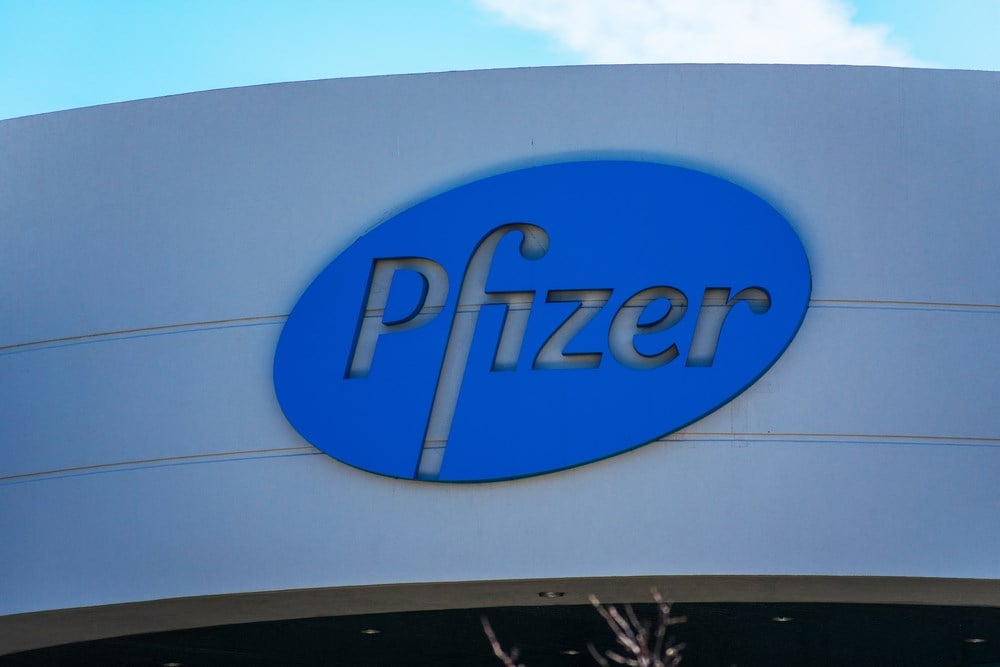
Pfizer Inc. (NYSE: PFE) continued its downward trajectory on May 17, following news that the Federal Trade Commission is seeking to block Amgen Inc.’s (NASDAQ: AMGN) planned acquisition of Horizon Therapeutics Plc (NASDAQ: HZNP).
Why would that news affect Pfizer?
Because it’s in the midst of its own $43 billion acquisition of Seagen Inc. (NASDAQ: SGEN). The FTC’s actions may signal tougher antitrust scrutiny in the pharmaceutical industry, which relies on mergers and acquisitions as part of the growth model.
The concern in Amgen's case is the potential for inflated prices of Horizon's drugs, including Krystexxa and Tepezza, due to limited competition. However, some analysts and industry insiders say the concern is misplaced in this case, and regulators may simply be flexing their muscles as a warning for the pharmaceutical industry.
Pfizer, Amgen Both Optimistic
Speaking at an industry conference on May 17, Pfizer chief development officer William Pao said he believed regulators would OK the Seagen acquisition. At the same conference, according to reports, Amgen CEO Robert Bradway also said he expected his company’s planned acquisition to go through.
The market was also worried that the deal may be scotched, which you can tell by looking at the Seagen chart. After the Pfizer acquisition was announced in March, Seagen shares gapped up 14.51% and remained in a tight trading range for the next several weeks.
That’s a very typical pattern for a company that’s being acquired. Investors understand that the stock won’t be valued any higher than the agreed-upon purchase amount, but they also won’t go lower. For that reason, a stock that’s being acquired is out of play: There’s no more risk-and-reward scenario.
Seagen Selloff
However, when the Amgen and Horizon deal came under review, markets quickly reacted, with Seagen shares being sold off. That was rational: If the merger didn’t look likely to be completed, some investors thought it would be a wise move to take some money off the table, after the big gap higher.
That’s not something that occurs much when it looks like a deal will go through. There’s often a little profit-taking after the gap-up, and you can see that on the Seagen chart.
However, existing investors typically want to hold their shares of the target, and receive shares in the acquiring company when the deal closes. Seagen shares rallied in the sessions following the May 16 gap-down, but have yet to regain their March levels.
Meanwhile consistent with what Pao said at the conference, Pfizer is proceeding as if the acquisition will happen.
Among The Biggest Bond Sales
On May 16, the company issued $31 billion in bonds to help finance the deal, in one of the largest bond sales on U.S. markets.
The Pfizer notes were issued in eight tranches, with coupons ranging from 4.450% to 5.340%, and maturity dates from 2025 through 2063. The longer bonds, of course, had the highest interest rates.
In the regulatory filing for the bond issuance, Pfizer wrote that if the Seagen merger is not completed before the bond’s maturity date, it would redeem the notes. The 2033 and 2053 notes would be exempt, likely because Pfizer wants the option to have some debt to apply to other projects, should the Seagen deal fall through.
It’s not unusual for companies to include such clauses when issuing debt to finance an acquisition.
Meanwhile, Pfizer’s free cash flow in the past 12 months is $20.21 billion.
Free cash flow is an important metric, as it indicates whether a company can easily service its debt, buy back shares, issue dividends or launch new projects without taking on too much debt.
Pfizer Trending Lower
Pfizer stock has been trending lower all year. In the past month, it’s down 9.76%. It’s not unusual for a stock’s price to decline after it announces an acquisition, as investors fret about additional debt or the use of cash reserves. However, because the downtrend began before the Seagen acquisition was announced, there’s clearly more going on.
This year, analysts expect Pfizer to earn $3.33 a share, down nearly 50% from 2022. Like every other pharmaceutical involved in Covid-related businesses, sales in that line of business are dropping. Pfizer, though, in its most recent report, said Covid sales, namely, vaccines and Paxlovid, were not declining as rapidly as analysts had expected.
Beating Analysts' Views
Pfizer earnings data show the company beat both top and bottom-line views in the most recent quarter.
As the stock has been falling, the Pfizer dividend yield has been rising, and now stands at 4.52%.
Despite the expected decline in Covid-related sales, there’s no reason to be concerned about Pfizer’s long-term prospects, as it has a robust pipeline of drugs, and analysts expect profit to grow again. However, use caution when trying to nab a high dividend yield, while a stock’s price is still dropping.





